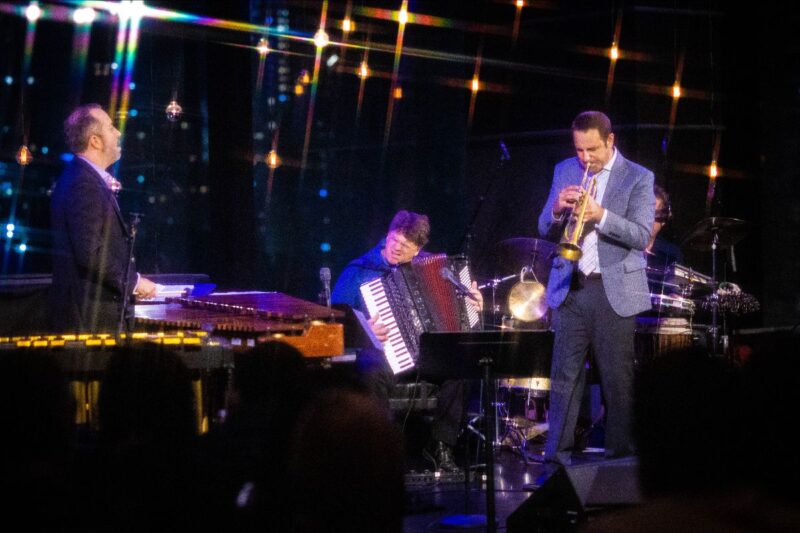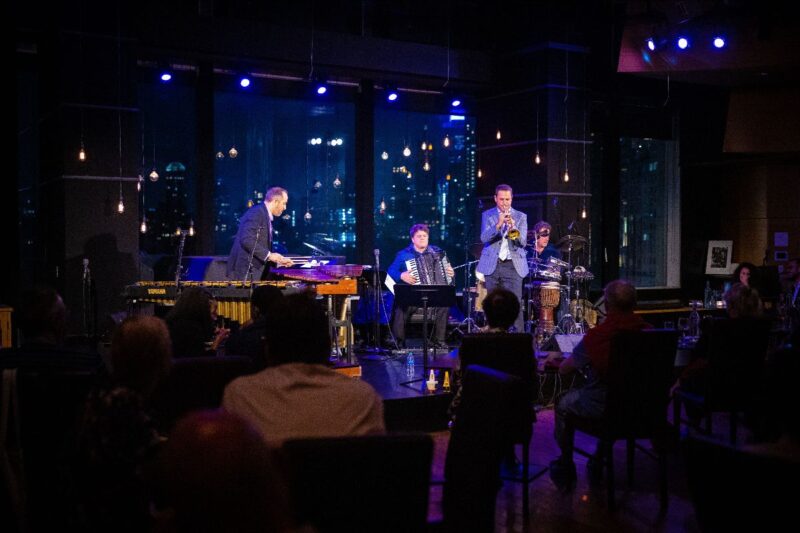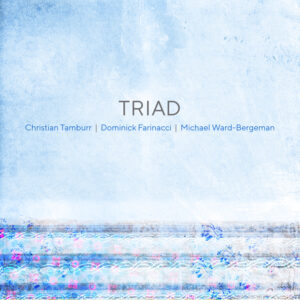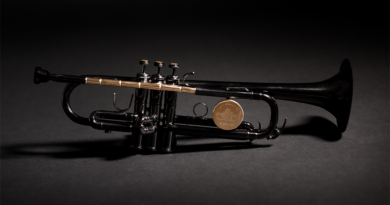TRIAD (Dominick Farinacci, Michael Ward-Bergeman, Christian Tamburr) Set to Release Debut Album
The members of TRIAD — who play stirring, challenging music but have the naturally sidesplitting rapport you’d find in a good buddy comedy — like to recount the rocky start of one auspicious run at the iconic Birdland Jazz Club in New York City.
As the band began to load in — Dominick Farinacci carrying his trumpet; Christian Tamburr hoisting his vibraphone and marimba; Michael Ward-Bergeman with his accordion — club owner Gianni Valenti became incredulous, even irate: “What the hell is this instrumentation? Where is the bass player?”
TRIAD began their soundcheck with Valenti glaring at them from the back of his venue, but “shortly into the first set,” Farinacci recalls, “he totally started to dig it, and he became very supportive of the concept.” In the end, the run was a rousing success with six sold-out shows, a trial by fire that proved to the band and their audiences that they’d hit upon a rare and inspired alliance.
That singular meld of personalities is what defines TRIAD and their new self-titled debut, out March 22, 2024 from Ropeadope. When the group first came together during a London residency, Farinacci explains, “I didn’t have a specific sound in mind. The only thing I had in mind was these two brilliant artists. I knew the chemistry would be really great between the three of us. And I love the out-of-the-box dynamic.”
TRIAD’s dynamic is certainly explorative — try and name another “jazz” debut that covers tunes by Astor Piazzolla, Screamin’ Jay Hawkins, Kurt Weill and John Mayer — but also resolutely focused. To start, these are three of the most widely accomplished musicians currently at work, whose individual résumés perfectly explain the collective TRIAD aesthetic — a space where a roots standard like “St. James Infirmary Blues” can be tackled with the telepathy of a modern jazz combo and the resourcefulness of a progressive chamber ensemble.

A Juilliard graduate, Farinacci ranks among the most acclaimed trumpeter-composers of his generation, whose endeavors — as a Jazz at Lincoln Center ambassador, a TED speaker, creator of the nationally lauded production Modern Warrior LIVE, and more — have broadened jazz’s ability to connect cultures and intersect with important mental health initiatives through the arts. Ward-Bergeman has earned praise in the classical world as a go-to accordionist for major North American symphony orchestras and a collaborator to Yo-Yo Ma; he has also recorded music for films by Francis Ford Coppola and worked with elders of the New Orleans jazz and brass-band traditions. Tamburr has made a career as a performer and composer-arranger in addition to his nonstop duties as a musical and creative director, for organizations and artists including Penn & Teller, Spiegelworld, Cirque du Soleil and vocalists Julio Iglesias, Clint Holmes, Wendy Moten and Shana Tucker.
As Farinacci explains, this cultivated musicianship grants the band the “freedom to hand off the different roles and responsibilities the instruments possess.” That means the elements of melody, harmony and rhythm are expertly and comprehensively covered, in ingenious ways that somehow present a far-reaching soundscape while demanding the listener savor each component of an arrangement. On record and especially in the vastness of a theater, the experience is immersive, even cinematic. “We get a lot of feedback from people who say, ‘This music sounds like something out of a movie,'” Tamburr explains. “And we play it with a thematic approach. The applications and textures that Michael uses, he can take just that single instrument and fill a whole space — rumbling the subwoofers of a theater, with the trumpet piercing over the top. And if you close your eyes, yeah, you can see the scene of the movie that we’d be supporting.”
A thoughtful, culturally wide-ranging idea of programming also serves that end, as TRIAD’s debut unfolds with a compelling sense of storytelling — an “orchestral delivery of this material where the audience goes on this journey with us and it’s not tune, tune, tune,” Tamburr says. On the album, that sensibility is fully realized through the sound design of engineer Michael Seifert, who mixed the recording, a veteran of sessions by Paul Simon, Regina Spektor, Tori Amos, Snarky Puppy and so many more. Onstage, the narrative concept is punctuated with joyful stage banter that’s both informative and often hilarious — part cool professor, part vaudeville, part road-seasoned musicians’ wit.
“All of this repertoire is very personal,” Ward-Bergeman says, “and before we thought about the lyrical or melodic content, it was like these are the songs that we brought in just as people — songs that were important enough to us to share with each other.” The tracklist kicks off with an elegiac arrangement of Piazzolla’s classic “Libertango” that became especially pivotal to TRIAD’s early development. Featuring Farinacci’s mournful trumpet and surges of accordion that rise and fade like flashes of memory, “Libertango” proved what was possible in this atypical format and how “the essence of our personalities could come through,” says Ward-Bergeman.

Two essential pieces of American music, “St. James Infirmary Blues” and “I Put a Spell on You,” are album highlights, both featuring the powerhouse vocalist Shenel Johns, a special guest on the album along with veteran percussionist Jamey Haddad.
With striking soulfulness, that quintet turns “I Put a Spell on You,” by Farinacci’s fellow Clevelander Screamin’ Jay Hawkins, into a wicked stomp, highlighted by the trumpeter’s radically muted solo, which suggests the delightfully nasty overblowing of early R&B sax. “St. James Infirmary Blues” becomes a haunting, frenzied, multilayered musical-theatre piece. Tamburr’s gorgeous arrangement of John Mayer and Pino Palladino’s “Stop This Train” is another moving story-song, replete with musical invocations of locomotive rhythm. The vibraphonist’s “La Lucha Dura” uses rhythmic thrust and interplay to capture the constantly shifting strategies Tamburr observed in a mixed-martial-arts fight. And although it “ultimately ends with a knockout,” Tamburr says, “it’s really about how me and Dominick counter each other.” (Takes of Kurt Weill’s “Je ne t’aime pas” and Yamandu Costa’s “Domingando” are similarly nimble.)
The co-credited “Interlude,” inspired by Little Jimmy Scott’s rendition of “When Did You Leave Heaven?,” and featuring that standard’s harmony, is quaint and nostalgic, a kind of midtempo sleepwalk drifting along on Tamburr’s subtle comping. Ward-Bergeman’s “Federal” is a dedication to the warm, generous people of Federal, Argentina, where the accordionist truly absorbed the lessons of chamamé, a tradition he fell in love with while working on Coppola’s 2009 film Tetro.
But perhaps the most affecting piece here — and the most revealing as to the beating heart of TRIAD — is Farinacci’s bittersweet ballad “A Prayer for You,” which he wrote for his mother as she was battling cancer.
A reflection of a TED Talk that Farinacci gave on music as a healing force, “A Prayer for You” is also “a way of acknowledging how everyone has been touched by cancer in some way. And acknowledging that that kind of trauma has a specific impact on the individual going through it as well as the support network around them. And when she was going through this I noticed myself kind of becoming really distant, and disengaging as a way of coping. I wasn’t able to support her in the way I needed to. So I wanted to write a song that held the opposite values of what I was feeling at the time — which was confusion. I wanted to have a very beautiful, simple and predictable kind of melody.”
And yet … Farinacci’s performance isn’t the primary focus, as “A Prayer for You” is mostly carried between marimba and accordion while the trumpeter arcs over the top of the main melody. “That’s the beautiful thing about this ensemble,” Farinacci says. “I came in, I said, ‘Here’s a song that’s very dear to me,’ and Michael’s like, ‘Yeah, why don’t you not play on it?'” All three musicians crack up.
“But I think that really represents the selflessness of the group,” Farinacci continues, “and the level of trust that we have.” That faith in and admiration for each other — as composers, as improvisers, as human beings — defines the extraordinary performances that comprise TRIAD’s debut.
List of Tracks
- Libertango (6:08)
- Federal (3:28)
- Je Ne T’aime Pas (5:36)
- Domingando (4:53)
- Interlude (2:53)
- I Put a Spell on You (3:58)
- A Prayer for You (3:29)
- St. James Infirmary Blues (9:55)
- La Lucha Dura (2:53)
- Stop This Train (5:53)
Photos are courtesy of Ropeadope
Source: Lydia Liebman Promotions




